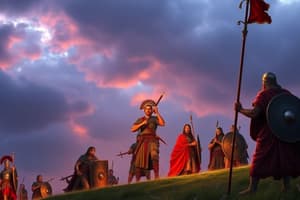Podcast
Questions and Answers
What was Camulodunum before the Roman invasion?
What was Camulodunum before the Roman invasion?
- A British stronghold (correct)
- A Roman fortress
- A triumphal arch
- A colōnia for veteran soldiers
What was the purpose of the triumphal arch in Camulodunum?
What was the purpose of the triumphal arch in Camulodunum?
- To provide employment for local British people
- To serve as a defense against rebellion
- To house the Twentieth Legion
- To commemorate Emperor Claudius' victory over the Britons (correct)
What did the Roman veterans do that angered the Britons?
What did the Roman veterans do that angered the Britons?
- They forced local people off their land (correct)
- They built a temple to the Divine Claudius
- They refused to pay taxes to Rome
- They encouraged rebellion against the Roman army
What was the outcome of Caratacus' capture by the Romans?
What was the outcome of Caratacus' capture by the Romans?
Who were the Druids and what was their role in Iron Age Britain and Gaul?
Who were the Druids and what was their role in Iron Age Britain and Gaul?
What was the accusation made against the Druids by the Romans?
What was the accusation made against the Druids by the Romans?
Flashcards are hidden until you start studying
Study Notes
Roman Britain: Kings, Queens, Resistance, and the Druids
- Togidubnus was a Roman client king of the Regni tribe, who supported the Romans and adopted a Roman lifestyle.
- Cartimandua, queen of the Brigantes, was friendly towards the Romans and allowed to keep her independence in exchange for loyalty.
- After Cartimandua divorced her husband, Venutius, he led a rebellion against her, and the Romans came to her aid, but she lost her throne.
- Caratacus, chief of the Catuvellauni, was the leader of the resistance against the Roman invasion, but was eventually defeated and captured.
- Caratacus was taken to Rome as a captive, where he made a proud speech, and Emperor Claudius freed him and his family.
- The Druids were a powerful group of people who acted as judges, teachers, and priests and were influential in Iron Age Britain and Gaul.
- After the Roman conquest, some Britons, including Druids, fled to the island of Anglesey, where they organized opposition to the Romans.
- Suetonius Paulinus, the Roman governor of Britain, attacked the Anglesey outpost of resistance in AD 60 or 61, defeating the British force and cutting down the Druids' groves.
- Julius Caesar described the Druids' education system and teachings, which included beliefs in the immortality of souls and interest in the universe and the power of gods.
- The Druids were accused of practicing human sacrifice, which was banned by Emperor Claudius as magic and superstition.
- Tacitus and Julius Caesar wrote about the Druids, with Tacitus presenting them as barbaric, while Caesar described their teachings and beliefs in a positive light.
- There is no firm evidence to support the claim that the Druids practiced human sacrifice, and the accusation could have been Roman propaganda.
Studying That Suits You
Use AI to generate personalized quizzes and flashcards to suit your learning preferences.




